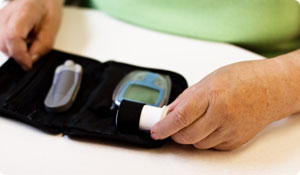
If you're a woman with diabetes, you need to be extra vigilant about your health. That's because diabetes can be particularly hazardous for women, according to research reported in the American Diabetes Association's Diabetes Forecast.
While a man with diabetes can expect to live an average of 7.5 years less than a man who doesn't have diabetes, a woman with diabetes typically will die more than eight years earlier than a woman without the disease.
Heart Disease and Other Concerns for Women With Diabetes
Unlike their counterparts without the disease, women with diabetes do not have lower rates of heart disease than men. They are also six times more likely to have heart disease. This is of particular concern because women who have heart attacks are much less likely than men to seek medical help, in part because they may not even be aware that they are experiencing a heart incident. Surprisingly, "Women can have a heart attack and not know it because they don't recognize the symptoms," says Patricia Vuguin, MD, attending physician in pediatric endocrinology at the Cohenz Children's Medical Center in New Hyde Park, NY. This is because the symptoms of a heart attack can be different for men and women, and women experiencing nausea, tiredness, light-headedness or dizziness, sleep problems may not know that these warning signs can indicate a heart attack. Meanwhile, one symptom associated with heart attacks, chest pain, is actually much more common in men. "Many women have heart attacks without chest pain," says Vuguin.
Additionally, women with diabetes are more likely to develop kidney disease, and they have higher rates of depression than men, reports Diabetes Forecast. Some research shows that women who have both diabetes and depression are twice as likely to die prematurely as women who don't have diabetes or depression.
So what can women with diabetes do to ensure they stay healthy?
- Eat a healthy diet, says Betul Hatipoglu, MD, an endocrinologist at the Cleveland Clinic. "Women need to take charge of their health," she says. "I advise my patients to eat a variety of fruits and vegetables, lean meat and fish, and whole grains."
- Keep your blood sugar under control and take prescribed medications appropriately, says Spyros Mezitis, MD, an endocrinologist at Lenox Hill Hospital in New York City. "Losing weight can be helpful, so try to exercise at least three times a week," he recommends.
- Educate yourself about how heart attack symptoms present in women, and see your health care provider for regular checkups on blood pressure and blood cholesterol. "It's important to have your cholesterol checked often, since higher cholesterol puts you at risk for a heart attack," Vuguin says.
- If you are of childbearing age, ask your physician about other health conditions that are associated with diabetes. According to the American Diabetes Association, many women with diabetes also have a condition called polycystic ovarian syndrome (PCOS). "With polycystic ovarian syndrome, the most common form of female infertility, a woman often doesn't have menstrual periods or has them only occasionally," Vuguin explains. Since the eggs are not released, most women with polycystic ovarian syndrome have trouble getting pregnant. These women, when they get pregnant, can be at a higher risk for problems like miscarriage. If you have polycystic ovarian syndrome, your physician may recommend that you see a high-risk obstetrician when you become pregnant.
Patricia Vuguin, MD, reviewed this article.
Source:
Gebel, Erika. "How Diabetes Differs for Men and Women." Diabetes Forecast. October 2011. Page last accessed 22 June 2013. http://forecast.diabetes.org/magazine/features/how-diabetes-differs-men-and-women
WomensHealth.gov. "Polycystic Ovary Syndrome (PCOS) Fact Sheet." Web. Page last updated 17 March 2010. Page Accessed 22 June 2013. http://womenshealth.gov/publications/our-publications/fact-sheet/polycystic-ovary-syndrome.cfm
American Diabetes Association. "Polycystic Ovarian Syndrome." Web. Page accessed 24 June 2013. http://www.diabetes.org/living-with-diabetes/women/polycystic-ovarian-syndrome.html





